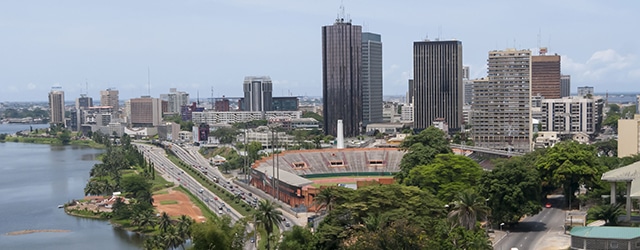Côte d’Ivoire offers much to foreign investors, and government administrators are getting used to what is involved.

|
COTE D’IVOIRE: VITAL STATISTICS |
|---|
|
Location: Western Africa |
|
Neighbors: Liberia, Guinea, Mali, Burkina Faso, Ghana |
|
Capital city: Abidjan |
|
Population (2018): 24,879,011 |
|
Official languages: French |
|
GDP per capita (2017): $1,620 |
|
GDP growth (2018): 7.4% |
|
Inflation (2018): 1.7% |
|
Currency: West African CFA Franc |
|
Investment promotion agency: Centre de Promotion des Investissements en Côte d’Ivoire |
|
Investment incentives available? Various, including reductions in taxes and license fees |
|
Ease of Doing Business rank (2017): 139 |
|
Corruption Perceptions Index rank (2016): 103 |
|
Political risks: Limited risk anticipated for 2020 election |
|
Security risks: Unresolved issues about war crimes from 2011 |
|
PROS |
|---|
|
No restrictions on repatriating profits |
|
West African CFA franc is a common currency with seven other countries and is on par with the Central African franc |
|
The CFA franc is pegged to the euro |
|
CONS |
|---|
|
Smuggling of commodities |
|
Lack of transparency in procedures |
|
Sources: allAfrica.com, IMF, Modern Ghana, Standard Bank, Reuters, Transparency International, World Bank |
|
For more information, check out Global Finance‘s Côte d’Ivoire data page. |
Location, location, location. It matters not only in real estate, but also in foreign direct investment.
And location-wise, Côte d’Ivoire is sitting pretty, suggests Youssouf Carius, previously chief economist at African rating agency Bloomfield Investment Corporation, now general manager of Pulsar Partners. The entire region is integrated commercially, he argues, and offers broad access given Abidjan’s status as a regional hub and the country’s economic capital. “From Abidjan you can deliver goods and services to Burkina Faso,” Carius explains. “You can deliver goods to Ghana, to Mali and go through Ghana to Nigeria.”
Côte d’Ivoire has other advantages, says Dominique Banny, head of client coverage for corporate and investment banking at Stanbic Bank Côte d’Ivoire. “Côte d’Ivoire is one of the countries in Africa [where] there is a strong push to attract foreign investors,” he says. He points to a good macroeconomic environment, which includes an emerging middle class, low inflation, a government keen on foreign investment and a strong push to eradicate corruption.
“If I were to compare Côte d’Ivoire to other countries that I know in Africa that were colonized by the French,” says Banny, “generally speaking, authorities are [more] welcoming [to] investors.” Carius itemizes a long list of sectors ripe for FDI, including construction, logistics, energy, retail, financial services, infrastructure, mining and agribusiness.
The financial sector attracted Stanbic, which in 2014 set up a representative office that is now a fully licensed operation. “Over the last seven or eight years, we have seen an average growth, especially of the banking sector, north of 15% per year,” Banny explains. “That was one of the reasons we decided to come to Côte d’Ivoire.” There’s a thirsty potential market—an estimated 95% of the population lacks insurance coverage, for example. FDI inflows also contributed to the bank’s decision, for opportunities to serve multinationals entering or expanding in the market.
Heineken International and the Hershey Company are among the foreign investors that have increased their financial commitments, with the beermaker investing a total of €150 million. Other companies have also done well, including Randgold Resources in the mining sector, which has invested €457 million and Burger King in the consumer sector.
Of course, no investment or location is without risks. Côte d’Ivoire has tried hard to put the crippling political crisis of 2010-2011 behind it, but unease lingers, with possibility of a crisis before the next scheduled presidential election, in 2020.
Several problems confront the foreign investor newly entering Côte d’Ivoire. “The regulatory environment is not so well done,” Carius says. “[The government] has limited familiarity with foreign companies and their procedures.” Permits and other legally required documents can be difficult to obtain. “You will have to have local interpreters who have a detailed and proven understanding of the administrative framework here in Côte d’Ivoire to handle that barrier,” he says.
Moreover, despite the government’s efforts to eradicate corruption, the country still ranks in the lower half of Transparency International’s Corruption Perceptions Index—although its score puts it in the top 20 for sub-Saharan Africa and above the continental average.
Venturing into Côte d’Ivoire also means understanding the sea changes among the major players. Due to its colonial history, French companies were initially its dominant source of FDI. That has changed, according to Banny: Morocco and China are now its leading investors.



